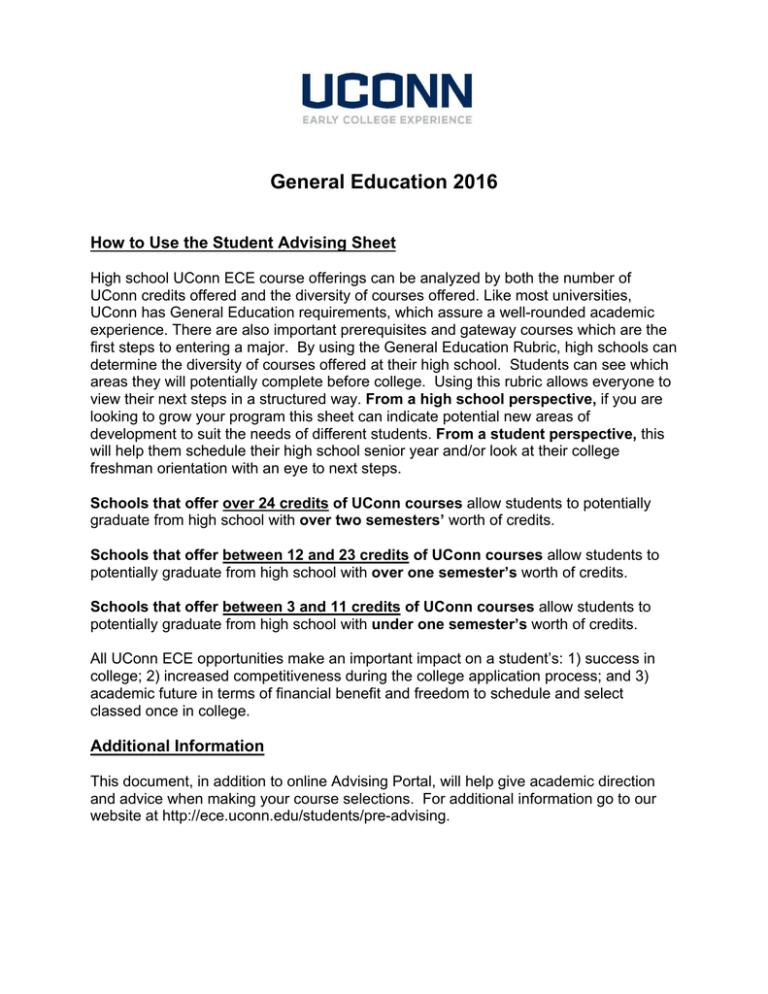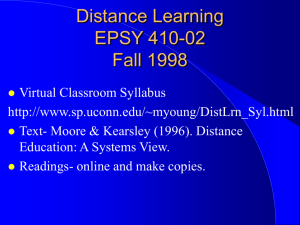General Education 2016 How to Use the Student Advising Sheet
advertisement

General Education 2016 How to Use the Student Advising Sheet High school UConn ECE course offerings can be analyzed by both the number of UConn credits offered and the diversity of courses offered. Like most universities, UConn has General Education requirements, which assure a well-rounded academic experience. There are also important prerequisites and gateway courses which are the first steps to entering a major. By using the General Education Rubric, high schools can determine the diversity of courses offered at their high school. Students can see which areas they will potentially complete before college. Using this rubric allows everyone to view their next steps in a structured way. From a high school perspective, if you are looking to grow your program this sheet can indicate potential new areas of development to suit the needs of different students. From a student perspective, this will help them schedule their high school senior year and/or look at their college freshman orientation with an eye to next steps. Schools that offer over 24 credits of UConn courses allow students to potentially graduate from high school with over two semesters’ worth of credits. Schools that offer between 12 and 23 credits of UConn courses allow students to potentially graduate from high school with over one semester’s worth of credits. Schools that offer between 3 and 11 credits of UConn courses allow students to potentially graduate from high school with under one semester’s worth of credits. All UConn ECE opportunities make an important impact on a student’s: 1) success in college; 2) increased competitiveness during the college application process; and 3) academic future in terms of financial benefit and freedom to schedule and select classed once in college. Additional Information This document, in addition to online Advising Portal, will help give academic direction and advice when making your course selections. For additional information go to our website at http://ece.uconn.edu/students/pre-advising. UConn General Education Content Area Distribution of UConn ECE Offerings 2016 Content Area 1 Arts and Humanities CAMS1103 FREN3268 HIST1300 HIST1400 HIST1501 HIST1502 MAST1200 MUSI1001 MUSI1004 POLS1002 Content Area 2 Social Sciences ECON1000 ECON1201 ECON1202 HDFS1070 HRTS1007 POLS1202 POLS1402 POLS1602 Content Area 3 Science and Technology MARN1002 NRE1000 SOIL2120 Content Area 3-LAB Science and Technology BIOL1107 BIOL1108 CHEM1127Q CHEM1128Q MARN1003 PHYS1201Q PHYS1202Q PHYS1401Q PHYS1402Q Content Area 4 Content Area 4-INT Diversity and Diversity and Multiculturalism Multiculturalism AMST1201 LAMS1190 HRTS1007 MUSI1004 POLS1202 POLS1402 At UConn there are four General Education content areas, which are completed when a student passes two classes per area, not from the same department. Freshman English One Freshmen English course is required at UConn for all students: ___ ENGL 1010 or ___ ENGL 1011 Quantitative and Writing Courses Students are required to take two quantitative (Q) courses in order to graduate (one of which has to be a Math or Stats Q-course) and 2 writing (W) courses in order to graduate (currently there are no W courses offered through UConn ECE). Quantitative Courses (those listed above and) ___ MATH 1030Q ___ MATH 1131Q ___ MATH 1132Q ___ STAT 1100Q Other Gateway Courses While these courses do not fulfill any General Education requirements, they are important gateway courses which are either required or support the completion of a major. Art – ART 1030 Civil Engineering – CE2110 Classics – CAMS3201 & CAMS 3102 Environmental Engineering – CE2110 Digital Media – DMD1000 Italian – ILCS 3239 & ILCS 3240 Mechanical Engineering – CE2110 Credits not used to fulfill general education requirements or a gateway course are used as electives, which count towards graduation.



